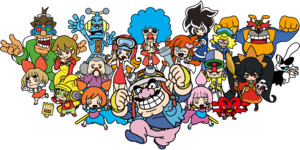WarioWare (series): Difference between revisions
No edit summary |
|||
| (15 intermediate revisions by 11 users not shown) | |||
| Line 24: | Line 24: | ||
==Development== | ==Development== | ||
[[File:Goro Abe.jpg|left|thumb|[[Goro Abe]], a key figure in ''WarioWare'' game development]] | [[File:Goro Abe.jpg|left|thumb|[[Goro Abe]], a key figure in ''WarioWare'' game development]] | ||
The [[Nintendo 64DD]] title ''[[Mario Artist: Polygon Studio]]'' featured a side mode called "Sound Bomber" which challenged the player to survive a rapid succession of very short minigames that increased in speed and difficulty as the player progressed. According to [[Goro Abe]] of Nintendo R&D1's ''WarioWare All-Star Team'', the first ''WarioWare'' came about when the team decided to make a full game around the concept.<ref> | The [[Nintendo 64DD]] title ''[[Mario Artist: Polygon Studio]]'' featured a side mode called "Sound Bomber" which challenged the player to survive a rapid succession of very short minigames that increased in speed and difficulty as the player progressed. According to [[Goro Abe]] of Nintendo R&D1's ''WarioWare All-Star Team'', the first ''WarioWare'' came about when the team decided to make a full game around the concept.<ref>{{cite|quote=In ''Polygon Studio'' you could create 3D models and animate them in the game, but there was also a side game included inside. In this game you would have to play short games that came one after another. This is where the idea for ''WarioWare'' came from.|author=Abe, Goro|url=games.kikizo.com/features/ncl_nintendo_wwiv_apr06_p3.asp|title=Nintendo R&D1 Interview|date=April 7, 2006|publisher=Kikizo|language=en|accessdate=June 29, 2024}}</ref> | ||
"Sound Bomber" was created by [[Koichi Kawamoto]] as his first assignment at Nintendo,<ref>Brian | "Sound Bomber" was created by [[Koichi Kawamoto]] as his first assignment at Nintendo,<ref>{{cite|author=Brian|date=March 5, 2017|url=nintendoeverything.com/1-2-switch-producer-says-the-game-wasnt-planned-to-be-part-of-warioware-why-it-isnt-pre-installed|title=1-2-Switch producer says the game wasn’t planned to be part of WarioWare, why it isn’t pre-installed|publisher=Nintendo Everything|language=en|accessdate=August 10, 2017}}</ref> though Kawamoto himself was uninvolved in the ''WarioWare'' games proper beyond "Concept" and "Prototype" credits for his work on ''Polygon Studio''. Teammate [[Yoshio Sakamoto]] continued, "To add on that, we got the idea of using Wario and the other characters because we couldn't think of anyone else who would be best for the role. Wario is always doing stupid things and is really idiotic, so we thought him and the rest of the characters would be best for the game." | ||
The original ''WarioWare'' was developed by a team of newer Nintendo staff members, some of whom had previously worked on ''[[Wario Land 4]]''. Both games shared the same director: R&D1 veteran [[Hirofumi Matsuoka]], who would leave Nintendo following the game's completion. Abe, who programmed and designed the original game, directed all later entries except for ''Snapped!''. Sakamoto, a longtime member and manager on the R&D1 team, was involved in the development of all games in the series but the first installment and ''WarioWare Gold'', and took on the role of producer starting with ''Twisted!'' Artist [[Ko Takeuchi]] designed Wario's biker outfit and created the original characters that appear in the series.<ref name="gpara_interview"> | The original ''WarioWare'' was developed by a team of newer Nintendo staff members, some of whom had previously worked on ''[[Wario Land 4]]''. Both games shared the same director: R&D1 veteran [[Hirofumi Matsuoka]], who would leave Nintendo following the game's completion. Abe, who programmed and designed the original game, directed all later entries except for ''Snapped!''. Sakamoto, a longtime member and manager on the R&D1 team, was involved in the development of all games in the series but the first installment and ''WarioWare Gold'', and took on the role of producer starting with ''Twisted!'' Artist [[Ko Takeuchi]] designed Wario's biker outfit and created the original characters that appear in the series.<ref name="gpara_interview">{{cite|language=ja|date=November 21, 2005|deadlink=y|archive=web.archive.org/web/20070122140200/http://www.gpara.com/contents/creator/bn_206.htm|title=クリエイターズ・ファイル:「優しいキモチが何よりも大切」任天堂、竹内高さん|publisher=Gpara|accessdate=June 29, 2024}}</ref> Other major figures in the development of the series include [[Intelligent Systems]] employees [[Taku Sugioka]] and [[Naoko Mori]], who acted as sub-directors and designers for most of the games. | ||
Since the first ''WarioWare'' game launched on [[Game Boy Advance]], every Nintendo system from the {{wp|Sixth generation of video game consoles|sixth generation}} onwards has had at least one entry of the series released for it, with each installment often making heavy use of the technological innovations of the system. | Since the first ''WarioWare'' game launched on [[Game Boy Advance]], every Nintendo system from the {{wp|Sixth generation of video game consoles|sixth generation}} onwards has had at least one entry of the series released for it, with each installment often making heavy use of the technological innovations of the system. | ||
| Line 43: | Line 43: | ||
|- | |- | ||
|<center>[[File:Wario-ware-inc-mega-microgamesUSA.jpg|145px]]<span style="font-size:8pt"><br>{{release|Japan|March 21, 2003}} [[Game Boy Advance]] </span></center> | |<center>[[File:Wario-ware-inc-mega-microgamesUSA.jpg|145px]]<span style="font-size:8pt"><br>{{release|Japan|March 21, 2003}} [[Game Boy Advance]] </span></center> | ||
|''WarioWare, Inc.: Mega Microgame$!'', known as ''WarioWare, Inc.: Minigame Mania'' in Europe, was the first installment in the series, and the first full-fledged game release to focus on a series of brief games presented in a hectic format. | |'''''WarioWare, Inc.: Mega Microgame$!''''', known as '''''WarioWare, Inc.: Minigame Mania''''' in Europe, was the first installment in the series, and the first full-fledged game release to focus on a series of brief games presented in a hectic format. | ||
The game was released for [[Nintendo 3DS]] and [[Wii U]] through [[Virtual Console]] in 2011 and 2014 respectively, though the former release is exclusive to the Nintendo 3DS Ambassador Program. It is also included in most versions of [[Game Boy Advance - Nintendo Switch Online]], released in 2023. | The game was released for [[Nintendo 3DS]] and [[Wii U]] through [[Virtual Console]] in 2011 and 2014 respectively, though the former release is exclusive to the Nintendo 3DS Ambassador Program. It is also included in most versions of [[Game Boy Advance - Nintendo Switch Online]], released in 2023. | ||
| Line 52: | Line 52: | ||
|- | |- | ||
|<center>[[File:Wwt.jpg|145px]]<span style="font-size:8pt"><br>{{release|Japan|October 14, 2004}} [[Game Boy Advance]] </span></center> | |<center>[[File:Wwt.jpg|145px]]<span style="font-size:8pt"><br>{{release|Japan|October 14, 2004}} [[Game Boy Advance]] </span></center> | ||
|''WarioWare: Twisted!'' has its microgames take advantage of the Game Boy Advance's rotation sensor and rumble feature. Its plot centers around Wario and one of his friends inventing a GBA-like handheld system that only reacts when tilted around. It was the first game in the series to organize microgames around the control scheme rather than around specific aesthetic styles. This game was going to be released in Europe, but the release was canceled because the gyro sensor was erroneously believed to contain mercury.<ref> | |'''''WarioWare: Twisted!''''' has its microgames take advantage of the Game Boy Advance's rotation sensor and rumble feature. Its plot centers around Wario and one of his friends inventing a GBA-like handheld system that only reacts when tilted around. It was the first game in the series to organize microgames around the control scheme rather than around specific aesthetic styles. This game was going to be released in Europe, but the release was canceled because the gyro sensor was erroneously believed to contain mercury.<ref>{{cite|deadlink=y|archive=web.archive.org/web/20161118055548/http://www.nec-tokin.com/english/product/piezodevice2/ceramicgyro.html|title=Product > Speciality Products > Piezoelectric Devices2 > Piezoelectric Devices >ceramic gyro|publisher=NEC/TOKIN|accessdate=June 29, 2024}}</ref> | ||
This installment introduced [[18-Volt]] and [[5-Volt]], who would go on to make further appearances throughout the series. | This installment introduced [[18-Volt]] and [[5-Volt]], who would go on to make further appearances throughout the series. | ||
| Line 59: | Line 59: | ||
|- | |- | ||
|<center>[[File:WWDS.jpg|145px]]<span style="font-size:8pt"><br>{{release|Japan|December 2, 2004}} [[Nintendo DS]] </span></center> | |<center>[[File:WWDS.jpg|145px]]<span style="font-size:8pt"><br>{{release|Japan|December 2, 2004}} [[Nintendo DS]] </span></center> | ||
|''WarioWare: Touched!'' was the first game in the series to be developed by Intelligent Systems. Its microgames generally make use of the Nintendo DS's [[Nintendo DS#Stylus|stylus]], touch screen controls, and microphone function. The game also features smaller, mostly non-competitive "toys," unlocked after completing several microgames, which too require the use of the touch screen for their tasks to be achieved. | |'''''WarioWare: Touched!''''' was the first game in the series to be developed by Intelligent Systems. Its microgames generally make use of the Nintendo DS's [[Nintendo DS#Stylus|stylus]], touch screen controls, and microphone function. The game also features smaller, mostly non-competitive "toys," unlocked after completing several microgames, which too require the use of the touch screen for their tasks to be achieved. | ||
The game was released for Wii U through Virtual Console in 2015. A Nintendo 3DS-exclusive [[DSiWare]] download version was also made available to users of [[My Nintendo]] for 1,000 Platinum Points between March 2016 and July 2016. | The game was released for Wii U through Virtual Console in 2015. A Nintendo 3DS-exclusive [[DSiWare]] download version was also made available to users of [[My Nintendo]] for 1,000 Platinum Points between March 2016 and July 2016. | ||
| Line 68: | Line 68: | ||
|- | |- | ||
|<center>[[File:Smooth moves cover.jpg|145px]]<span style="font-size:8pt"><br>{{release|Japan|December 2, 2006}} [[Wii]]</span></center> | |<center>[[File:Smooth moves cover.jpg|145px]]<span style="font-size:8pt"><br>{{release|Japan|December 2, 2006}} [[Wii]]</span></center> | ||
|''WarioWare: Smooth Moves'' features microgames that rely on the Wii's motion controls. Gameplay requires the player to hold the [[Wii#Wii Remote|Wii Remote]] (referred to in-game as the "Form Baton") in different positions. After the player completes all of the single-player stages, the game unlocks a multiplayer mode, in which only one Wii Remote is used, with up to 12 players sharing and taking turns with it after each microgame is completed. | |'''''WarioWare: Smooth Moves''''' features microgames that rely on the Wii's motion controls. Gameplay requires the player to hold the [[Wii#Wii Remote|Wii Remote]] (referred to in-game as the "Form Baton") in different positions. After the player completes all of the single-player stages, the game unlocks a multiplayer mode, in which only one Wii Remote is used, with up to 12 players sharing and taking turns with it after each microgame is completed. | ||
The game was released for Wii U through Virtual Console, initially in 2016. | The game was released for Wii U through Virtual Console, initially in 2016. | ||
| Line 77: | Line 77: | ||
|- | |- | ||
|<center>[[File:WarioWare Snapped logo.png|145px]]<span style="font-size:8pt"><br>{{release|Japan|December 24, 2008}} [[DSiWare]]</span></center> | |<center>[[File:WarioWare Snapped logo.png|145px]]<span style="font-size:8pt"><br>{{release|Japan|December 24, 2008}} [[DSiWare]]</span></center> | ||
|''WarioWare: Snapped!'' uses the [[Nintendo DSi]]'s camera to control the minigames. Set in a theme park, this is the first time that Wario was featured for a console launch instead of Mario. The player uses a built-in camera to stand-in for a character in-game, with various objectives including mimicking movements to grab objects, opening a mouth, or catching objects with the head. | |'''''WarioWare: Snapped!''''' uses the [[Nintendo DSi]]'s camera to control the minigames. Set in a theme park, this is the first time that Wario was featured for a console launch instead of Mario. The player uses a built-in camera to stand-in for a character in-game, with various objectives including mimicking movements to grab objects, opening a mouth, or catching objects with the head. | ||
The game was | The game was made available on [[Nintendo eShop]] for the [[Nintendo 3DS]] upon the console's release. | ||
|- | |- | ||
!colspan="2"style="font-size:125%;text-align:left"|''[[WarioWare: D.I.Y.]]'' | !colspan="2"style="font-size:125%;text-align:left"|''[[WarioWare: D.I.Y.]]'' | ||
|- | |- | ||
|<center>[[File:USWarioDIY.png|145px]]<span style="font-size:8pt"><br>{{release|Japan|April 29, 2009}} [[Nintendo DS]]</span></center> | |<center>[[File:USWarioDIY.png|145px]]<span style="font-size:8pt"><br>{{release|Japan|April 29, 2009}} [[Nintendo DS]]</span></center> | ||
|''WarioWare: D.I.Y.'' allows players to create their own microgames with the [[Super MakerMatic 21]], a machine that can also make music records and 4-page black-and-white comics. When Wario is amazed by this invention and its potential to make huge fortunes, he restarts his company, but many of his employees have quit, so he decides to have the player make the games for him. The game also features some pre-made microgames. | |'''''WarioWare: D.I.Y.''''' allows players to create their own microgames with the [[Super MakerMatic 21]], a machine that can also make music records and 4-page black-and-white comics. When Wario is amazed by this invention and its potential to make huge fortunes, he restarts his company, but many of his employees have quit, so he decides to have the player make the games for him. The game also features some pre-made microgames. | ||
|- | |- | ||
!colspan="2"style="font-size:125%;text-align:left"|''[[WarioWare: D.I.Y. Showcase]]'' | !colspan="2"style="font-size:125%;text-align:left"|''[[WarioWare: D.I.Y. Showcase]]'' | ||
|- | |- | ||
|<center>[[File:WWDIYS WiiWare.jpg]]<span style="font-size:8pt"><br>{{release|Japan|April 29, 2009}} [[WiiWare]]</span></center> | |<center>[[File:WWDIYS WiiWare.jpg]]<span style="font-size:8pt"><br>{{release|Japan|April 29, 2009}} [[WiiWare]]</span></center> | ||
|''WarioWare: D.I.Y. Showcase'' is a [[WiiWare]] game in which microgames made in ''WarioWare: D.I.Y.'' can be uploaded and played. ''D.I.Y. Showcase'' features downloadable post-release updates and an unlockable versus mode where microgames are played in a shuffled format. The game also features its own pre-made microgames different to those in ''D.I.Y.'' | |'''''WarioWare: D.I.Y. Showcase''''' is a [[WiiWare]] game in which microgames made in ''WarioWare: D.I.Y.'' can be uploaded and played. ''D.I.Y. Showcase'' features downloadable post-release updates and an unlockable versus mode where microgames are played in a shuffled format. The game also features its own pre-made microgames different to those in ''D.I.Y.'' | ||
|- | |- | ||
!colspan="2"style="font-size:125%;text-align:left"|''[[Game & Wario]]'' | !colspan="2"style="font-size:125%;text-align:left"|''[[Game & Wario]]'' | ||
|- | |- | ||
|<center>[[File:Box NA - Game & Wario.png|145px]]<span style="font-size:8pt"><br>{{release|Japan|March 28, 2013}} [[Wii U]]</span></center> | |<center>[[File:Box NA - Game & Wario.png|145px]]<span style="font-size:8pt"><br>{{release|Japan|March 28, 2013}} [[Wii U]]</span></center> | ||
|''Game & Wario'', described as a "successor" to the ''WarioWare'' series,<ref> | |'''''Game & Wario''''', described as a "successor" to the ''WarioWare'' series,<ref>{{cite|deadlink=y|archive=web.archive.org/web/20141130180822/http://www.computerandvideogames.com/351817/wii-u-game-wario-announced|title=E3 2012: Game & Wario Announced|author=Griffin, Ben|date=June 5, 2012|publisher={{wp|Computer and Video Games}}|accessdate=June 29, 2024|language=en}}</ref> features various games utilizing the [[Wii U#Wii U GamePad|Wii U GamePad]], including its touch screen, motion controls, and camera. Instead of the typical microgames, this particular entry features a set of sixteen more elaborate minigames (12 single-player titles and 4 multiplayer ones), as well as a capsule machine called the "[[Cluck-A-Pop]]" which can be used to unlock additional content. ''Game & Wario'' also introduces a new artistic direction, under which most characters are slightly redesigned. | ||
|- | |- | ||
!colspan="2"style="font-size:125%;text-align:left"|''[[WarioWare Gold]]'' | !colspan="2"style="font-size:125%;text-align:left"|''[[WarioWare Gold]]'' | ||
|- | |- | ||
|<center>[[File:WarioWare Gold NA cover.png|145px]]<span style="font-size:8pt"><br>{{release|Europe|July 27, 2018}} [[Nintendo 3DS]]</span></center> | |<center>[[File:WarioWare Gold NA cover.png|145px]]<span style="font-size:8pt"><br>{{release|Europe|July 27, 2018}} [[Nintendo 3DS]]</span></center> | ||
|''WarioWare Gold'' was the first entry in the series to see its first release in Western territory, in its case in Europe, as well as the only installment to be initially released for [[Nintendo 3DS]]. It features a total of over 300 microgames (the most featured in any series entry to date), consisting of microgames returning from each of the previous games in the series in addition to new ones. The games involve multiple functions: from pressing buttons to tilting the system, from touching the touch screen to blowing on the microphone. ''Gold'' also features full voice acting, the first ''WarioWare'' game to do so, with an additional feature allowing players to overdub their voice over the game's cutscenes. | |'''''WarioWare Gold''''' was the first entry in the series to see its first release in Western territory, in its case in Europe, as well as the only installment to be initially released for [[Nintendo 3DS]]. It features a total of over 300 microgames (the most featured in any series entry to date), consisting of microgames returning from each of the previous games in the series in addition to new ones. The games involve multiple functions: from pressing buttons to tilting the system, from touching the touch screen to blowing on the microphone. ''Gold'' also features full voice acting, the first ''WarioWare'' game to do so, with an additional feature allowing players to overdub their voice over the game's cutscenes. | ||
The game's plot begins with Wario stealing a [[Pot of Luxeville|golden pot]] from the rural village of [[Luxeville]]. Realizing that he is completely broke, he views a TV report on the success of a new video game, then capitalizes on this by hosting a video game tournament with a huge reward to the victor but an expensive entry fee. Unbeknownst to him, a small girl named [[Lulu]] is pursuing him in an attempt to retrieve the pot he had stolen, which at the end of the game is revealed to be merely a toilet used by the people of Luxeville. | The game's plot begins with Wario stealing a [[Pot of Luxeville|golden pot]] from the rural village of [[Luxeville]]. Realizing that he is completely broke, he views a TV report on the success of a new video game, then capitalizes on this by hosting a video game tournament with a huge reward to the victor but an expensive entry fee. Unbeknownst to him, a small girl named [[Lulu]] is pursuing him in an attempt to retrieve the pot he had stolen, which at the end of the game is revealed to be merely a toilet used by the people of Luxeville. | ||
| Line 108: | Line 108: | ||
|- | |- | ||
|<center>[[File:WWGIT Box NA.jpg|145px]]<span style="font-size:8pt"><br>September 10, 2021<br>[[Nintendo Switch]]</span></center> | |<center>[[File:WWGIT Box NA.jpg|145px]]<span style="font-size:8pt"><br>September 10, 2021<br>[[Nintendo Switch]]</span></center> | ||
|''WarioWare: Get It Together!'' is the first game in the series to be released for [[Nintendo Switch]]. It features the mechanic of playing as different characters in the microgames. Each character has different abilities, meaning they have to find different ways to beat each microgame. The game features multiplayer, where two players can compete in the same microgames. | |'''''WarioWare: Get It Together!''''' is the first game in the series to be released for [[Nintendo Switch]]. It features the mechanic of playing as different characters in the microgames. Each character has different abilities, meaning they have to find different ways to beat each microgame. The game features multiplayer, where two players can compete in the same microgames. | ||
|- | |- | ||
!colspan="2"style="font-size:125%;text-align:left"|''[[WarioWare: Move It!]]'' | !colspan="2"style="font-size:125%;text-align:left"|''[[WarioWare: Move It!]]'' | ||
|- | |- | ||
|<center>[[File:WWMI NA cover.jpg|145px]]<span style="font-size:8pt"><br>November 3, 2023<br>[[Nintendo Switch]]</span></center> | |<center>[[File:WWMI NA cover.jpg|145px]]<span style="font-size:8pt"><br>November 3, 2023<br>[[Nintendo Switch]]</span></center> | ||
|''WarioWare: Move It!'' is the second game in the series to initially release for Nintendo Switch. Much like ''WarioWare: Smooth Moves'', it makes use of motion controls in its microgames, of which there are over 200. It is also the first game to feature [[Kevin Afghani]] succeeding [[Charles Martinet]] in voicing Wario. | |'''''WarioWare: Move It!''''' is the second game in the series to initially release for Nintendo Switch. Much like ''WarioWare: Smooth Moves'', it makes use of motion controls in its microgames, of which there are over 200. It is also the first game to feature [[Kevin Afghani]] succeeding [[Charles Martinet]] in voicing Wario. | ||
|} | |} | ||
| Line 127: | Line 127: | ||
|- | |- | ||
|<center>[[File:Megapartygames.jpg|145px]]<span style="font-size:8pt"><br>{{release|Japan|October 17, 2003}} [[Nintendo GameCube]] </span></center> | |<center>[[File:Megapartygames.jpg|145px]]<span style="font-size:8pt"><br>{{release|Japan|October 17, 2003}} [[Nintendo GameCube]] </span></center> | ||
|''WarioWare, Inc.: Mega Party Game$!'' is a [[Reissue|port]] of ''WarioWare, Inc.: Mega Microgame$!'', released for the [[Nintendo GameCube]]. It features the earlier game's microgames, but with a heavier focus on multiplayer. Despite being a reissue, it is officially considered a separate entry in the series.<ref> | |'''''WarioWare, Inc.: Mega Party Game$!''''' is a [[Reissue|port]] of ''WarioWare, Inc.: Mega Microgame$!'', released for the [[Nintendo GameCube]]. It features the earlier game's microgames, but with a heavier focus on multiplayer. Despite being a reissue, it is officially considered a separate entry in the series.<ref>{{cite|url=www.nintendo.com/jp/character/wario/en/history/index.html|language=en|title=Company History|publisher=WarioWare, Inc. Official Site|accesdate=June 29, 2024}}</ref><ref>{{cite|url=iwataasks.nintendo.com/interviews/wii/warioware_smooth_moves/0/0|title=Iwata Asks: ''WarioWare Smooth Moves''|publisher=Nintendo of America|language=en-us|accessdate=June 29, 2024}}</ref><ref>{{cite|url=iwataasks.nintendo.com/interviews/ds/diy/0/0|title=Iwata Asks: ''WarioWare: D.I.Y.''|publisher=Nintendo of America|language=en-us|accessdate=June 29, 2024}}</ref><ref>{{cite|url=iwataasks.nintendo.com/interviews/ds/dsi/4/0|title=Volume 5: ''WarioWare: Snapped!'' - Iwata Asks|publisher=Nintendo of America|language=en-us|accessdate=June 29, 2024}}</ref> | ||
|} | |} | ||
| Line 141: | Line 141: | ||
|- | |- | ||
|[[File:MenuLogoPyoro.png]]<span style="font-size:8pt"><br>{{release|Japan|December 24, 2008}} [[DSiWare]]</span> | |[[File:MenuLogoPyoro.png]]<span style="font-size:8pt"><br>{{release|Japan|December 24, 2008}} [[DSiWare]]</span> | ||
|This DSiWare game is a remake of the minigame "[[Pyoro (minigame)|Pyoro]]" that appears in ''Mega Microgame$!'' In the game, the bird Pyoro uses his long tongue to eat beans which can destroy parts of the ground, while also trying to avoid getting hit by them. This game also remakes [[Pyoro 2|the original minigame's sequel]], in which Pyoro spits seeds at the beans instead. | |This DSiWare game is a remake of the minigame "[[Pyoro (minigame)|Pyoro]]" that appears in '''''Mega Microgame$!''''' In the game, the bird Pyoro uses his long tongue to eat beans which can destroy parts of the ground, while also trying to avoid getting hit by them. This game also remakes [[Pyoro 2|the original minigame's sequel]], in which Pyoro spits seeds at the beans instead. | ||
|- | |- | ||
!colspan="2"style="font-size:125%;text-align:left"|''[[Paper Airplane Chase]]'' | !colspan="2"style="font-size:125%;text-align:left"|''[[Paper Airplane Chase]]'' | ||
|- | |- | ||
|[[File:MenuLogoPaperPlane.png]]<span style="font-size:8pt"><br>{{release|Japan|December 24, 2008 }} [[DSiWare]]</span> | |[[File:MenuLogoPaperPlane.png]]<span style="font-size:8pt"><br>{{release|Japan|December 24, 2008 }} [[DSiWare]]</span> | ||
|''Paper Airplane Chase'' is a DSiWare game that is a remake of the minigame [[Paper Plane (minigame)|Paper Plane]] from ''WarioWare, Inc.: Mega Microgame$!''. There are three modes unlike in the original minigame: Endless Mode (similar to the original), Time Attack, and Race Mode. In Endless Mode, the paper plane avoids obstacles and gains points. In Time Attack, the paper plane needs to finish the course as quickly as it can. Finally, in Race Mode, two players attempt to race their paper planes. | |'''''Paper Airplane Chase''''' is a DSiWare game that is a remake of the minigame [[Paper Plane (minigame)|Paper Plane]] from ''WarioWare, Inc.: Mega Microgame$!''. There are three modes unlike in the original minigame: Endless Mode (similar to the original), Time Attack, and Race Mode. In Endless Mode, the paper plane avoids obstacles and gains points. In Time Attack, the paper plane needs to finish the course as quickly as it can. Finally, in Race Mode, two players attempt to race their paper planes. | ||
|} | |} | ||
| Line 219: | Line 219: | ||
!colspan="3"style="font-size:125%;text-align:left"|[[Orbulon]] | !colspan="3"style="font-size:125%;text-align:left"|[[Orbulon]] | ||
|- | |- | ||
|<center>[[File:WWGIT Orbulon. | |<center>[[File:WWGIT Orbulon Artwork.png|100px]] | ||
|''[[WarioWare, Inc.: Mega Microgame$!]]'' | |''[[WarioWare, Inc.: Mega Microgame$!]]'' | ||
|Orbulon is a highly intelligent alien of unknown origin who has difficulty with human language, as evidenced by his unusual speaking style in which he frequently replaces common words and terms with more complicated descriptions. He has an IQ of 300 and is over 2000 years old. Orbulon originally intended to conquer [[Earth]], but after his spaceship, the [[Oinker]], crash-landed onto the planet, he settled into life in Diamond City and indefinitely postponed his mission of conquest, instead studying the language and way of life of humans. | |Orbulon is a highly intelligent alien of unknown origin who has difficulty with human language, as evidenced by his unusual speaking style in which he frequently replaces common words and terms with more complicated descriptions. He has an IQ of 300 and is over 2000 years old. Orbulon originally intended to conquer [[Earth]], but after his spaceship, the [[Oinker]], crash-landed onto the planet, he settled into life in Diamond City and indefinitely postponed his mission of conquest, instead studying the language and way of life of humans. He is frequently seen in mishaps involving crashing his ship. | ||
In ''Mega Microgame$!'' and ''D.I.Y.'', Orbulon's microgames are known as "IQ" games; these last longer and require more thinking than those of other characters, with many involving counting and finding objects on the screen. In ''Gold'', his microgames are themed around fantasy, while in ''Get It Together!'', they are themed around culture. In ''Twisted!'', his microgames are all twice as long as those of other characters. | In ''Mega Microgame$!'' and ''D.I.Y.'', Orbulon's microgames are known as "IQ" games; these last longer and require more thinking than those of other characters, with many involving counting and finding objects on the screen. In ''Gold'', his microgames are themed around fantasy, while in ''Get It Together!'', they are themed around culture. In ''Twisted!'', his microgames are all twice as long as those of other characters. | ||
| Line 337: | Line 337: | ||
|<center>[[File:Ken WWMI.jpg|150px]]</center> | |<center>[[File:Ken WWMI.jpg|150px]]</center> | ||
|''[[WarioWare, Inc.: Mega Microgame$!]]'' | |''[[WarioWare, Inc.: Mega Microgame$!]]'' | ||
|Ken | |Ken is a dog seen on TV shows in the series. In ''Mega Microgame$!'', he is a news reporter and is seen at the start of the game announcing the success of the ''[[Pyoro (minigame)|Pyoro]]'' video game on Wario's TV, inspiring Wario to found his own company; Ken later reports on the success of [[WarioWare, Inc.]] as well, which he is also seen doing in ''Twisted!'' He returns in ''Touched!'' as the host of the show [[Ear Candy]] and in ''Smooth Moves'' and ''Move It!'' as a sports commentator. Various similar dog news reporters have also appeared in the series, namely [[Rocky the Reporter]] in ''Touched!'', [[Reporter John]] in ''Game & Wario'', and [[Ben]] in ''Gold''. | ||
|- | |- | ||
!colspan="3"style="font-size:125%;text-align:left"|[[Alien Bunny|Alien Bunnies]] | !colspan="3"style="font-size:125%;text-align:left"|[[Alien Bunny|Alien Bunnies]] | ||
| Line 355: | Line 355: | ||
|<center>[[File:The Dinosaurs.png]]</center> | |<center>[[File:The Dinosaurs.png]]</center> | ||
|''[[WarioWare: Twisted!]]'' | |''[[WarioWare: Twisted!]]'' | ||
|The Dinosaurs are a | |The Dinosaurs are a pair of characters who antagonize Mona. They appear in some of Mona's subplots as antagonists, rivalling her in her business, though she always manages to outperform them. In ''Twisted!'', they own the restaurant chain [[Pizza Dinosaur]], a rival of [[Mona Pizza]] with inferior pizzas and customer service but a very large number of locations. In ''Touched!'', they are members of a band with [[Vanessa]], rivalling Mona's band. | ||
|- | |- | ||
!colspan="3"style="font-size:125%;text-align:left"|[[Mandrake]] | !colspan="3"style="font-size:125%;text-align:left"|[[Mandrake]] | ||
| Line 402: | Line 402: | ||
|ChiSR=Wǎlì'ōu Zhìzào | |ChiSR=Wǎlì'ōu Zhìzào | ||
|ChiSM=Made in Wario | |ChiSM=Made in Wario | ||
|ChiT=瓦利歐製造<ref> | |ChiT=瓦利歐製造<ref>{{cite|language=zh-hant|date=June 16, 2021|url=www.nintendo.com.hk/topics/article/a_210616_01.html|title=E3發表的Nintendo Switch遊戲軟體最新資訊公開! 多款支援中文作品預定發售!|publisher=Nintendo HK|accessdate=June 16, 2021}}</ref> | ||
|ChiTR=Wǎlì'ōu Zhìzào | |ChiTR=Wǎlì'ōu Zhìzào | ||
|ChiTM=Made in Wario | |ChiTM=Made in Wario | ||
| Line 413: | Line 413: | ||
*From ''[[WarioWare, Inc.: Mega Party Game$!]]'' to ''[[WarioWare Gold]]'', the European game covers of ''WarioWare'' games were all yellow, whereas other regions vary in cover color with each game. | *From ''[[WarioWare, Inc.: Mega Party Game$!]]'' to ''[[WarioWare Gold]]'', the European game covers of ''WarioWare'' games were all yellow, whereas other regions vary in cover color with each game. | ||
*From ''[[WarioWare, Inc.: Mega Microgame$!]]'' to ''[[WarioWare: Touched!]]'', Wario's voice clips were recycled from ''[[Wario Land 4]]'' and ''[[Wario World]]''. From ''[[WarioWare: Smooth Moves]]'' onward, Wario has a set of unique voice clips. | *From ''[[WarioWare, Inc.: Mega Microgame$!]]'' to ''[[WarioWare: Touched!]]'', Wario's voice clips were recycled from ''[[Wario Land 4]]'' and ''[[Wario World]]''. From ''[[WarioWare: Smooth Moves]]'' onward, Wario has a set of unique voice clips. | ||
==References== | |||
<references/> | |||
==External links== | ==External links== | ||
*[https://www.nintendo.com/jp/character/wario/index.html Official website (Japanese)] | *[https://www.nintendo.com/jp/character/wario/index.html Official website (Japanese)] | ||
*[https://www.nintendo.com/jp/character/wario/en/index.html Official website (English)] | *[https://www.nintendo.com/jp/character/wario/en/index.html Official website (English)] | ||
{{Wario games}} | {{Wario games}} | ||
Revision as of 18:57, September 1, 2024
- "WarioWare" redirects here. For the in-game company, see WarioWare, Inc. For the Super Smash Bros. stage based on the series, see WarioWare, Inc. (stage). For the microgame from WarioWare: Get It Together!, see WarioWare (microgame).
- "WarioWare Series" redirects here. For the microgame from WarioWare: Move It!, see WarioWare Series (microgame).
| WarioWare | |
|---|---|
 Logo design since WarioWare: Get It Together! | |
| First installment | WarioWare, Inc.: Mega Microgame$! (2003) |
| Latest installment | WarioWare: Move It! (2023) |
| Number of installments | 12 |
| Franchise | Wario |
| Key staff | Goro Abe, Taku Sugioka, Ko Takeuchi, Naoko Mori, Yoshio Sakamoto |
WarioWare is a series of comedy-based party games published by Nintendo, featuring Wario as the main character. A series within the Wario franchise, it was introduced in 2003 with the release of WarioWare, Inc.: Mega Microgame$! for the Game Boy Advance. While the first two games were developed by Nintendo R&D 1 (which became part of Nintendo SPD, which has now merged into Nintendo EPD), subsequent games have been co-developed by Intelligent Systems.
The games in the series are collections of very short and simple games, called "microgames" or "minigames", played in quick succession. They also feature a story that centers around Wario (who, in most of these games, wears a biker outfit rather than his usual attire) founding the video game studio WarioWare, Inc. in Diamond City and hiring numerous friends of his to develop the microgames for him. The WarioWare games often make heavy use of the technological innovations of the console for which they are released.
Wario's design from the WarioWare series is his default outfit in the Super Smash Bros. series, and the series is also the basis of the WarioWare, Inc. stage in Super Smash Bros. Brawl, Super Smash Bros. for Nintendo 3DS, and Super Smash Bros. Ultimate.
Overview
Most WarioWare games consist of a collection of very short, simple games, called "microgames", presented in quick succession. A microgame may, for example, require the player to pop a balloon, pick a nose, attack a spaceship, or make Wario collect coins in a maze styled after those in Pac-Man. Each microgame usually lasts about three to five seconds and failing to complete it costs the player a life, with the game ending once they lose all four lives. The microgames are split across a number of stages based on genre or category, with each stage being hosted by a different character (or group of characters), and there are also usually "remix" stages that compile the microgames from previous stages; the microgames are ordered randomly and steadily increase in speed and difficulty as the player progresses, with the player's score increasing by one at the start of every microgame until they run out of lives. Boss microgames, which are longer and more complex than other microgames, appear at fixed points in stages; upon completing one of these, the player can regain a lost life (with a maximum of four). Unlike with other microgames, losing a boss microgame with at least one life remaining forces the player to retry it and does not increase their score. The first time the player plays a stage, completing the boss microgame causes them to win and ends the stage; on subsequent attempts, the stage does not end until the player runs out of lives, with an increase in difficulty after each boss microgame. In addition to the microgame stages, WarioWare games also often feature unlockable extra modes (such as the ability to play any microgame freely) and larger minigames. Each WarioWare game often features a unique way to control its microgames, such as motion controls, touch screen and microphone controls, or controlling one of several unique characters.
The plots of these games center on Wario, his video game company WarioWare, Inc., and his friends in Diamond City who produce microgames for the company. Because of his greed, Wario usually refuses to pay his friends, despite the high success of their games. Most games in the series include a number of short stories in the form of cutscenes dedicated to each of the characters, depicting their adventures or everyday lives. These cutscenes are usually split into two parts, the first one shown at the start of the character's microgame stage and the second appearing after the player beats the stage; the first part will typically set up a problem or event of some kind that is then shown being resolved as the player completes microgames.
Development
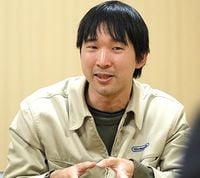
The Nintendo 64DD title Mario Artist: Polygon Studio featured a side mode called "Sound Bomber" which challenged the player to survive a rapid succession of very short minigames that increased in speed and difficulty as the player progressed. According to Goro Abe of Nintendo R&D1's WarioWare All-Star Team, the first WarioWare came about when the team decided to make a full game around the concept.[1]
"Sound Bomber" was created by Koichi Kawamoto as his first assignment at Nintendo,[2] though Kawamoto himself was uninvolved in the WarioWare games proper beyond "Concept" and "Prototype" credits for his work on Polygon Studio. Teammate Yoshio Sakamoto continued, "To add on that, we got the idea of using Wario and the other characters because we couldn't think of anyone else who would be best for the role. Wario is always doing stupid things and is really idiotic, so we thought him and the rest of the characters would be best for the game."
The original WarioWare was developed by a team of newer Nintendo staff members, some of whom had previously worked on Wario Land 4. Both games shared the same director: R&D1 veteran Hirofumi Matsuoka, who would leave Nintendo following the game's completion. Abe, who programmed and designed the original game, directed all later entries except for Snapped!. Sakamoto, a longtime member and manager on the R&D1 team, was involved in the development of all games in the series but the first installment and WarioWare Gold, and took on the role of producer starting with Twisted! Artist Ko Takeuchi designed Wario's biker outfit and created the original characters that appear in the series.[3] Other major figures in the development of the series include Intelligent Systems employees Taku Sugioka and Naoko Mori, who acted as sub-directors and designers for most of the games.
Since the first WarioWare game launched on Game Boy Advance, every Nintendo system from the sixth generation onwards has had at least one entry of the series released for it, with each installment often making heavy use of the technological innovations of the system.
Games
| Title | |
|---|---|
| Cover, original release, and system | Overview |
| WarioWare, Inc.: Mega Microgame$! | |
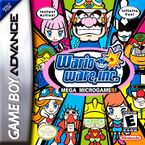 Template:Release Game Boy Advance |
WarioWare, Inc.: Mega Microgame$!, known as WarioWare, Inc.: Minigame Mania in Europe, was the first installment in the series, and the first full-fledged game release to focus on a series of brief games presented in a hectic format.
The game was released for Nintendo 3DS and Wii U through Virtual Console in 2011 and 2014 respectively, though the former release is exclusive to the Nintendo 3DS Ambassador Program. It is also included in most versions of Game Boy Advance - Nintendo Switch Online, released in 2023. The main roster of original characters introduced in this game, namely Jimmy T, Dribble & Spitz, Mona, 9-Volt, Orbulon, Dr. Crygor, Kat & Ana, and Pyoro, would all go on to appear regularly throughout the series. |
| WarioWare: Twisted! | |
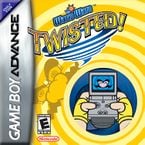 Template:Release Game Boy Advance |
WarioWare: Twisted! has its microgames take advantage of the Game Boy Advance's rotation sensor and rumble feature. Its plot centers around Wario and one of his friends inventing a GBA-like handheld system that only reacts when tilted around. It was the first game in the series to organize microgames around the control scheme rather than around specific aesthetic styles. This game was going to be released in Europe, but the release was canceled because the gyro sensor was erroneously believed to contain mercury.[4]
This installment introduced 18-Volt and 5-Volt, who would go on to make further appearances throughout the series. |
| WarioWare: Touched! | |
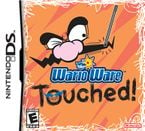 Template:Release Nintendo DS |
WarioWare: Touched! was the first game in the series to be developed by Intelligent Systems. Its microgames generally make use of the Nintendo DS's stylus, touch screen controls, and microphone function. The game also features smaller, mostly non-competitive "toys," unlocked after completing several microgames, which too require the use of the touch screen for their tasks to be achieved.
The game was released for Wii U through Virtual Console in 2015. A Nintendo 3DS-exclusive DSiWare download version was also made available to users of My Nintendo for 1,000 Platinum Points between March 2016 and July 2016. This installment introduced Ashley, Red, and Mike, who would go on to make further appearances throughout the series. |
| WarioWare: Smooth Moves | |
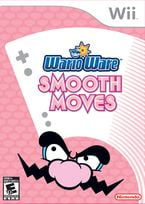 Template:Release Wii |
WarioWare: Smooth Moves features microgames that rely on the Wii's motion controls. Gameplay requires the player to hold the Wii Remote (referred to in-game as the "Form Baton") in different positions. After the player completes all of the single-player stages, the game unlocks a multiplayer mode, in which only one Wii Remote is used, with up to 12 players sharing and taking turns with it after each microgame is completed.
The game was released for Wii U through Virtual Console, initially in 2016. This installment introduced Penny, Young Cricket, and Master Mantis, who would go on to make further appearances throughout the series. |
| WarioWare: Snapped! | |
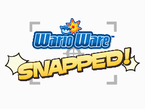 Template:Release DSiWare |
WarioWare: Snapped! uses the Nintendo DSi's camera to control the minigames. Set in a theme park, this is the first time that Wario was featured for a console launch instead of Mario. The player uses a built-in camera to stand-in for a character in-game, with various objectives including mimicking movements to grab objects, opening a mouth, or catching objects with the head.
The game was made available on Nintendo eShop for the Nintendo 3DS upon the console's release. |
| WarioWare: D.I.Y. | |
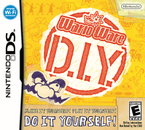 Template:Release Nintendo DS |
WarioWare: D.I.Y. allows players to create their own microgames with the Super MakerMatic 21, a machine that can also make music records and 4-page black-and-white comics. When Wario is amazed by this invention and its potential to make huge fortunes, he restarts his company, but many of his employees have quit, so he decides to have the player make the games for him. The game also features some pre-made microgames. |
| WarioWare: D.I.Y. Showcase | |
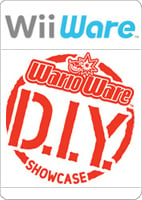 Template:Release WiiWare |
WarioWare: D.I.Y. Showcase is a WiiWare game in which microgames made in WarioWare: D.I.Y. can be uploaded and played. D.I.Y. Showcase features downloadable post-release updates and an unlockable versus mode where microgames are played in a shuffled format. The game also features its own pre-made microgames different to those in D.I.Y. |
| Game & Wario | |
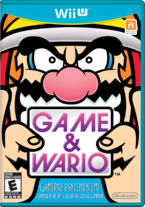 Template:Release Wii U |
Game & Wario, described as a "successor" to the WarioWare series,[5] features various games utilizing the Wii U GamePad, including its touch screen, motion controls, and camera. Instead of the typical microgames, this particular entry features a set of sixteen more elaborate minigames (12 single-player titles and 4 multiplayer ones), as well as a capsule machine called the "Cluck-A-Pop" which can be used to unlock additional content. Game & Wario also introduces a new artistic direction, under which most characters are slightly redesigned. |
| WarioWare Gold | |
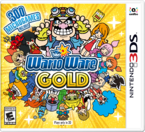 Template:Release Nintendo 3DS |
WarioWare Gold was the first entry in the series to see its first release in Western territory, in its case in Europe, as well as the only installment to be initially released for Nintendo 3DS. It features a total of over 300 microgames (the most featured in any series entry to date), consisting of microgames returning from each of the previous games in the series in addition to new ones. The games involve multiple functions: from pressing buttons to tilting the system, from touching the touch screen to blowing on the microphone. Gold also features full voice acting, the first WarioWare game to do so, with an additional feature allowing players to overdub their voice over the game's cutscenes.
The game's plot begins with Wario stealing a golden pot from the rural village of Luxeville. Realizing that he is completely broke, he views a TV report on the success of a new video game, then capitalizes on this by hosting a video game tournament with a huge reward to the victor but an expensive entry fee. Unbeknownst to him, a small girl named Lulu is pursuing him in an attempt to retrieve the pot he had stolen, which at the end of the game is revealed to be merely a toilet used by the people of Luxeville. Aside from Lulu, this game also introduces 13-Amp; both would make further appearances throughout the series. |
| WarioWare: Get It Together! | |
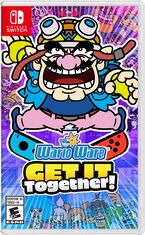 September 10, 2021 Nintendo Switch |
WarioWare: Get It Together! is the first game in the series to be released for Nintendo Switch. It features the mechanic of playing as different characters in the microgames. Each character has different abilities, meaning they have to find different ways to beat each microgame. The game features multiplayer, where two players can compete in the same microgames. |
| WarioWare: Move It! | |
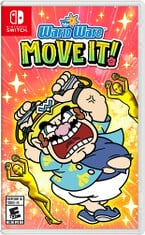 November 3, 2023 Nintendo Switch |
WarioWare: Move It! is the second game in the series to initially release for Nintendo Switch. Much like WarioWare: Smooth Moves, it makes use of motion controls in its microgames, of which there are over 200. It is also the first game to feature Kevin Afghani succeeding Charles Martinet in voicing Wario. |
Reissues
| Title | |
|---|---|
| Cover, original release, and system | Overview |
| WarioWare, Inc.: Mega Party Game$! | |
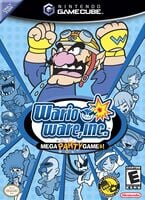 Template:Release Nintendo GameCube |
WarioWare, Inc.: Mega Party Game$! is a port of WarioWare, Inc.: Mega Microgame$!, released for the Nintendo GameCube. It features the earlier game's microgames, but with a heavier focus on multiplayer. Despite being a reissue, it is officially considered a separate entry in the series.[6][7][8][9] |
Remakes of individual minigames
| Title | |
|---|---|
| Profile picture, original release, and system | Description |
| Bird & Beans | |
Template:Release DSiWare |
This DSiWare game is a remake of the minigame "Pyoro" that appears in Mega Microgame$! In the game, the bird Pyoro uses his long tongue to eat beans which can destroy parts of the ground, while also trying to avoid getting hit by them. This game also remakes the original minigame's sequel, in which Pyoro spits seeds at the beans instead. |
| Paper Airplane Chase | |
Template:Release DSiWare |
Paper Airplane Chase is a DSiWare game that is a remake of the minigame Paper Plane from WarioWare, Inc.: Mega Microgame$!. There are three modes unlike in the original minigame: Endless Mode (similar to the original), Time Attack, and Race Mode. In Endless Mode, the paper plane avoids obstacles and gains points. In Time Attack, the paper plane needs to finish the course as quickly as it can. Finally, in Race Mode, two players attempt to race their paper planes. |
Characters
Major characters
| Name | ||
|---|---|---|
| Artwork | First appearance | Description |
| Wario | ||
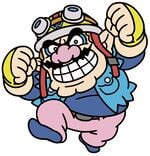
|
WarioWare, Inc.: Mega Microgame$! | Wario is the greedy CEO of his self-named company WarioWare, Inc. He realizes that the video game industry could potentially be very profitable, so he establishes his gaming enterprise and begins creating microgames with his computer for the sole purpose of making a profit for himself, though he soon gets bored and calls his friends to help him.
Wario undergoes various transformations throughout the series, namely Wario-Man, a mock superhero with the ability to fly (appearing in Twisted!, Touched!, and D.I.Y. Showcase); Tiny Wario, originating from the earlier Wario Land games, which here also multiplies him (appearing in Smooth Moves); Captain Wario, which has him wearing a pirate outfit (appearing in Game & Wario); Wario Deluxe, a form that has him wear the stolen Pot of Luxeville as a crown, giving him red eyes, a gold-colored suit, and a deeper voice (appearing in Gold); the Wario Bug, a form of his virtual self in his game corrupted by game bugs (appearing in Get It Together!); and Volcano Wario, a form he takes upon unintentionally fusing with the Perspiration Peak Volcano (appearing in Move It!). Unlike most of the other characters, who tend to host one level each, Wario usually hosts two levels in each game: the first level, featuring "Intro Games", and the final level, featuring "Anything Goes" microgames. In the latter, he usually assumes one of his transformations. Wario's microgames usually feature him in some way, as a playable character or otherwise. |
| Jimmy T | ||
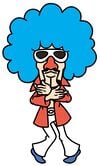
|
WarioWare, Inc.: Mega Microgame$! | Jimmy T (the "T" standing for "Thang") is an afro-wearing man who is a disco dancing fanatic to the point that he will sometimes dance involuntarily. He is obsessed with partying and frequents nightclubs within Diamond City, such as Club Sugar. He is also often seen using his cell phone that Dr. Crygor invented. In some games, members of Jimmy's family appear, including his parents (Papa T. and Mama T.) and siblings (his brother James T. and sister Jamie T.), who all share his love of dancing. He also has a doppelganger with a different color scheme called Jimmy P.
In Mega Microgame$!, D.I.Y., Gold, and Get It Together!, Jimmy's microgames are themed around sports. His microgames in Twisted! require that the player make large movements; in Touched!, they involve the player rubbing objects. Additionally, Jimmy and his family often host stages remixing the microgames from previous stages. |
| Mona | ||

|
WarioWare, Inc.: Mega Microgame$! | Mona is a high school student who works various part-time jobs, which vary from game to game. She is quite adventurous and fashionable, but she tends to be late to wherever she is going. To make up for lost time, Mona often speeds on her scooter (which was invented by Dr. Crygor) and uses the assistance of her mischievous pets to stop anyone trying to slow her down. She also wields a boomerang as a weapon. Her occupations have included working as a Gelateria employee (in Mega Microgame$!), a waitress at Restaurant Sora Sora (in Mega Party Game$!), a pizza delivery girl for Mona Pizza (in Twisted!), the bassist of a rock band called "Mona and the Hot Slices" with Art and Deco (in Touched!), the leader of the football cheerleaders the Monettes (in Smooth Moves), one of the operators of a dumpling stand on Park Street (also in Smooth Moves), an ancient temple explorer (in D.I.Y.), and a photojournalist for the Diamond City Times (in Game & Wario). A businessman dog called Joe serves as Mona's boss throughout her various jobs, and she sometimes has a group of rivals in her business called the Dinosaurs whom she always manages to outperform. Additionally, Mona has a crush on Wario.
Mona's microgames are usually based around everyday activities such as tooth brushing, sawing, and nose picking, sometimes with bizarre twists; in Mega Microgame$! and D.I.Y., these are known as "Strange" games, while in Gold and Get It Together!, they are known as "That's Life" games. Her microgames in Twisted! require that the player make small movements; in Touched!, they mostly involve the player cutting objects. |
| Dribble & Spitz | ||
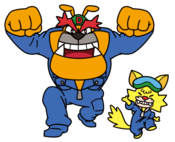
|
WarioWare, Inc.: Mega Microgame$! | Dribble and Spitz are two anthropomorphic animal characters ― the former a bulldog and the latter a cat ― who work as cabbies together. They speak with Bronx accents (Kansai in the original Japanese). Dribble's taxi was constructed by Dr. Crygor and can go anywhere, even into outer space. Dribble is described as a "speed freak" with a somewhat short temper, while Spitz, though smaller than Dribble, is his superior and is smarter and more adept at driving than him, and he generally stays calm (though not always). The duo's levels often involve them picking up strange, seemingly supernatural passengers and/or forgetting to collect their customer's fare.
In Mega Microgame$! and D.I.Y. Showcase, the duo's microgames are themed around science-fiction, while in Gold and Get It Together!, they are themed around fantasy. Their microgames in Twisted! require both moving the system and pressing |
| Kat & Ana | ||
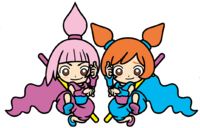
|
WarioWare, Inc.: Mega Microgame$! | Kat and Ana are kindergarteners and twin sisters, distinguishable primarily by their differing hair colors (Kat's is pink while Ana's is orange). Kat is more headstrong and dominant, while Ana is timid and slightly younger than Kat. The two are ninjas who reside in an old-fashioned Japanese-style house in a forest and are descended from the Iga Clan of ninjas. They attend Mystical Ninja Elementary as well as Diamond City Kindergarten. They always carry their katanas, which were invented by Dr. Crygor, and often spend time practicing ninjutsu. They adore nature, especially animals and plants, and as such have several pets: Shadow the Dog, Don the Sparrow, Shuriken the Falcon, Numchuck the Monkey, and several unnamed turtles.
Because of their aforementioned love of nature, Kat & Ana's microgames are themed around it in Mega Microgame$! and Get It Together!, featuring animals, plants, and natural environments. In D.I.Y. Showcase, their microgames are exclusively themed around animals, while in Gold, their microgames are themed around everyday activities. Their microgames in Twisted! do not require any movements to complete; in Touched!, they involve the player drawing objects. |
| 9-Volt | ||
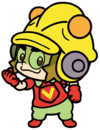
|
WarioWare, Inc.: Mega Microgame$! | 9-Volt is a fourth-grade elementary schooler and a Nintendo fanatic who owns everything ever made by the company. He is so addicted to his games that he often stays up to play past his bedtime, to the ire of his mother 5-Volt. He also enjoys skateboarding with his special skateboard the SK8 (invented by Dr. Crygor), as well as DJing and playing with his yo-yo, and he owns a pet called Fronk who was lost and was rescued by 9-Volt. He attends Diamond City Elementary along with his best friend 18-Volt, who he enjoys playing games with and who often visits his house to do so.
9-Volt's microgames are always based on Nintendo products, mostly classic games. Since the introduction of 18-Volt in Twisted!, 9-Volt has often shared his levels with him. |
| Dr. Crygor | ||

|
WarioWare, Inc.: Mega Microgame$! | Dr. Crygor is a mad scientist who performs bizarre experiments in his laboratory in Diamond City, as well as frequently having to go to the bathroom. He is over 100 years old and is a cyborg, having various robotic body parts that he made for himself, as well as a life-support suit that keeps him from aging. His inventions also include various vehicles, the karaoke robot Mike (who he originally programmed as a cleaning robot), the cleaning robot Doris 1, a diet machine called the Kelorometer, and various other technology seen throughout Diamond City. In Touched!, he accidentally gets caught in his latest invention and becomes younger and more fit, with red accents to his costume, as well as a full helmet; these changes remain for part of Smooth Moves.
In Mega Microgame$!, Dr. Crygor's microgames are known as "Reality" games and feature partly animated photographs, such as photos of animals, people, and food. In Gold, his microgames are themed around sports, while in Get It Together!, they are themed around technology. In Twisted!, his microgames are themed around manipulation of gravity; in Touched!, they involve rotating objects. |
| Orbulon | ||
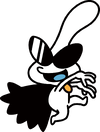
|
WarioWare, Inc.: Mega Microgame$! | Orbulon is a highly intelligent alien of unknown origin who has difficulty with human language, as evidenced by his unusual speaking style in which he frequently replaces common words and terms with more complicated descriptions. He has an IQ of 300 and is over 2000 years old. Orbulon originally intended to conquer Earth, but after his spaceship, the Oinker, crash-landed onto the planet, he settled into life in Diamond City and indefinitely postponed his mission of conquest, instead studying the language and way of life of humans. He is frequently seen in mishaps involving crashing his ship.
In Mega Microgame$! and D.I.Y., Orbulon's microgames are known as "IQ" games; these last longer and require more thinking than those of other characters, with many involving counting and finding objects on the screen. In Gold, his microgames are themed around fantasy, while in Get It Together!, they are themed around culture. In Twisted!, his microgames are all twice as long as those of other characters. |
| 18-Volt | ||
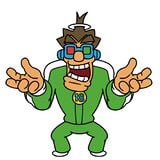
|
WarioWare: Twisted! | 18-Volt is 9-Volt's best friend. Like 9-Volt, he is a fan of video games and frequently visits 9-Volt's House to play games with him. He attends Diamond City Elementary in fourth grade in the same class as 9-Volt, despite being considerably larger than he is. He loves music (especially rapping), as evidenced by the CD he wears on his head and the large boombox he often carries; as seen in WarioWare: Twisted!, his loud music gets him into trouble on his first day of school, although he soon finds an admirer in 9-Volt.
18-Volt usually shares his levels with 9-Volt, so he retains 9-Volt's theme of Nintendo products for his microgames. |
| Ashley | ||
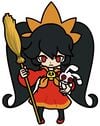
|
WarioWare: Touched! | Ashley is a young witch-in-training who lives in her haunted mansion. She is very stoic and emotionless, hardly ever showing positive facial expressions if at all, and is also very easily irritated. She is often seen training in her magic, both inside her mansion and in other places. Despite Ashley's penchant for dark spells and her large ego, she is lonely and secretly wants more friends. She is usually accompanied by her companion Red.
Ashley usually shares her stages with Red. In D.I.Y. and Get It Together!, her microgames are themed around food, while in Gold, they are themed around fantasy. In Touched!, her microgames involve the player dragging objects. |
| Red | ||

|
WarioWare: Touched! | Red is Ashley's small imp friend who acts as her loyal assistant and is capable of shape-shifting into items like a wand or a broom for her to use, as well as translating other languages for her. Red's personality is the polar opposite of Ashley's, being outgoing, cheerful, and easily frightened, and he is often humorously mistreated by Ashley. He usually shares his stages with Ashley. |
| Mike | ||
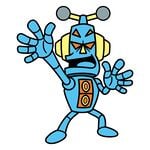
|
WarioWare: Touched! | Mike is a singing-obsessed karaoke robot made by Dr. Crygor. He has a pair of microphones attached to the stand on his head, which he often uses for karaoke. Despite Mike being a robot built for karaoke, Dr. Crygor initially programs him as a cleaning robot, as seen in WarioWare: Touched! Eventually, his programming goes haywire when he blows on a pile of dust and his karaoke programming overrides his systems, making him obsessed with singing and parties (despite his apparent lack of skill at singing). Although Mike is usually critical of his creator Crygor, he is nonetheless often seen accompanying him.
In Touched! and Gold, Mike's microgames make use of the system's microphone, requiring that the player make a noise into the microphone to complete the microgame; although Mike hosts his own stage in Touched!, he does not in Gold, in which his microgames are mixed in with those of other characters in later stages instead. In Get It Together!, he hosts a stage remixing the microgames of previous stages. |
| Young Cricket | ||

|
WarioWare: Smooth Moves | Young Cricket is a devoted martial artist who trains through tough conditions as he travels the world, guided by his sensei Master Mantis. In addition to training in martial arts, he loves eating meat dumplings.
Young Cricket often shares his stages with Master Mantis; in Gold, their microgames are themed around sports. |
| Master Mantis | ||

|
WarioWare: Smooth Moves | Master Mantis is Young Cricket's wise and elderly but somewhat lazy sensei, who accompanies him in his travels and training. He is supposedly an extremely powerful master of many martial arts, though he rarely demonstrates this power. He takes Cricket to a variety of areas for training, from harsh conditions to places where Mantis wants to be for recreation. In addition to training in martial arts, Mantis shares Cricket's love of eating meat dumplings.
Young Cricket and Master Mantis usually share their stages with each other; in Gold, their microgames are themed around sports. |
| Penny | ||
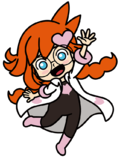
|
WarioWare: Smooth Moves | Penny is a middle school student who attends Diamond Academy and is the granddaughter of Dr. Crygor. She admires her grandfather as an excellent scientist and wants to grow up to become a great scientist herself. To this end, she creates various inventions in her lab, albeit with varying success. However, she also loves singing and has a desire to become a famous pop star.
In Gold, Penny's microgames are themed around everyday activities, while in Get It Together!, she hosts a stage remixing the microgames of previous stages. |
| 5-Volt | ||
 |
WarioWare: Twisted!
Game & Wario (full appearance) |
5-Volt is 9-Volt's mother. She enjoys cooking, gardening, and, like her son, gaming. Although she is caring for 9-Volt, she is also very strict and often gets extremely angry at him for playing games past his bedtime. She was originally a minor character whose appearance was obscured, but her full appearance was revealed in Game & Wario, and she is a major character starting with WarioWare Gold.
In Gold, 5-Volt's microgames are based on Nintendo games and products, like those of 9-Volt and 18-Volt. In Get It Together! and Move It!, she hosts a stage remixing the microgames of previous stages. |
| Lulu | ||
 |
WarioWare Gold | Lulu is a stubborn and boisterous young girl from the rural village Luxeville. She claims to be the village's hero and wears a giant ribbon in which she packs large amounts of food. She first appears in WarioWare Gold, in which she is angry at Wario due to him stealing the Pot of Luxeville that is used as a chamber pot in the village; she goes to Diamond City in order to reclaim it, only to discover upon eventually succeeding that the village's mayor Pops installed a modern toilet instead in her absence. Lulu joins the main cast starting with WarioWare: Get It Together!, but she still holds a grudge against Wario despite being his employee. She is an adoring fan of Young Cricket and friends with a dog called Ruffington, and she wields the Hydrocannon LX as a weapon.
In Move It!, she hosts a stage remixing the microgames of previous stages. |
| Pyoro | ||
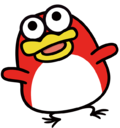
|
WarioWare, Inc.: Mega Microgame$! | Pyoro is a bird character who appears in almost every game in the series. He is the main character of a very successful video game series that inspires Wario to found WarioWare, Inc. Pyoro often stars in his own minigames that can be unlocked by playing every microgame at least once. He is red and uses his stretchy tongue to eat beans and fend off evil insects that try to destroy his flowers, home, etc., except in Pyoro 2, in which he is yellow and spits seeds at the beans. In WarioWare: Get It Together!, he invades Wario's game for fun and kidnaps three of his employees, eventually being defeated as the final boss of the story mode, after which he becomes playable as the game's final crew member. Pyoro is also the main character of the DSiWare spin-off game Bird & Beans, a remake of Pyoro and Pyoro 2. Pyoro's name and design are a parody of Kyorochan, the mascot of the Japanese chocolate brand Chocoball. |
| Fronks | ||
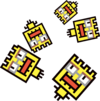
|
WarioWare, Inc.: Mega Microgame$! | The Fronks are a yellow, blocky species of creatures that appear throughout the series, both in microgames and in cutscenes. In addition to their standard yellow appearance, Fronks also have several rarely seen alternate appearances, sometimes being red or blue or having different faces from normal.
One particular Fronk, also called Fronk (originally named Shag), is kept by 9-Volt as a pet; he denies that he is a pet and is wise despite being only one year old (which he views as old age). Fronk has his own microgames in Twisted! and Gold, but they appear in other characters' levels rather than Fronk having his own dedicated level. These microgames are especially short and tend to feature Fronks. |
Recurring characters
| Name | ||
|---|---|---|
| Artwork | First appearance | Description |
| Joe | ||
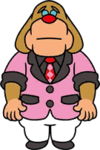 |
WarioWare, Inc.: Mega Microgame$! | Joe is a dog businessman and a recurring character in the series who is often featured in Mona's subplots, usually as her boss. His jobs include the owner of the Gelateria in Mega Microgame$!, the owner of Mona Pizza in Twisted!, both a football announcer and a staff member at a dumpling stand in Smooth Moves (as well as the curator of the Temple of Form), an ancient temple explorer and the runner of Diamond Software in D.I.Y., the newspaper editor for the Diamond City Times in Game & Wario, the manager of both the clothing store Joe's Clothes and the nightclub Club Joe in Gold, and a member of a fitness crew at Feelin' Groovy Fitness who is briefly the leader of the crew until Jimmy T takes over in Get It Together! |
| Mona's Pets | ||
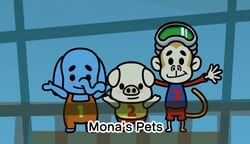 |
WarioWare, Inc.: Mega Microgame$! (Mona's Elephant, Mona's Pig, and Mona's Monkey) WarioWare: Touched! (4.1 and 4.2) WarioWare: Smooth Moves (Mona's Bear) |
Mona's Pets are a group of small, mischievous animals owned by Mona who often accompany her. The group usually consists of three members, also known collectively as the Yum Yums: Mona's Elephant, Mona's Pig (previously known as Mona's Piggy), and Mona's Monkey (previously known as Mona's Chimp). However, there are also three other members that appear in only one game each: 4.1, 4.2, and Mona's Bear. Mona's Pets live in Mona's House, though they are often shown inhabiting her scooter and are deployed by Mona to help her defeat anyone who may be pursuing her; Mona's Elephant can fire sludge from its trunk, Mona's Pig can kick soccer balls, and Mona's Monkey can toss banana peels. 4.1 and 4.2 are shown to pilot an aircraft with which they can fire soccer balls. |
| Ken | ||
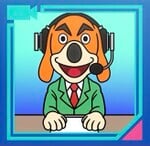 |
WarioWare, Inc.: Mega Microgame$! | Ken is a dog seen on TV shows in the series. In Mega Microgame$!, he is a news reporter and is seen at the start of the game announcing the success of the Pyoro video game on Wario's TV, inspiring Wario to found his own company; Ken later reports on the success of WarioWare, Inc. as well, which he is also seen doing in Twisted! He returns in Touched! as the host of the show Ear Candy and in Smooth Moves and Move It! as a sports commentator. Various similar dog news reporters have also appeared in the series, namely Rocky the Reporter in Touched!, Reporter John in Game & Wario, and Ben in Gold. |
| Alien Bunnies | ||
 |
WarioWare, Inc.: Mega Microgame$! | Alien Bunnies (originally called Space Hares) are a recurring species of aliens who often appear as minor characters in the series. In addition to several appearances in microgames, they attempt to rescue Orbulon from his predicament in Mega Microgame$!, serve as Orbulon's minions in Twisted!, attend Mike's intergalactic karaoke party in Touched!, and serve as assistants for Wario and Mr. Sparkles in Gold, among several other background appearances throughout the series (often floating in space or the sky). In addition to their appearances in the WarioWare series, they also appear in the Rhythm Heaven series, which is developed by the same team as the WarioWare games. |
| Jimmy's Folks | ||
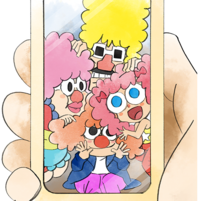 |
WarioWare: Twisted! (Papa T. and Mama T.) WarioWare: Touched! (James T. and Jamie T.) |
Jimmy's Folks are the family of Jimmy T, consisting of his father Papa T., his mother Mama T., his brother James T., and his sister Jamie T. All four of them have very similar personalities to Jimmy, as they all share his love of dancing, are avid users of their cell phones, and frequent Club Sugar. They also all have large colorful afros, red noses, and sunglasses like Jimmy. In Twisted!, Papa T. and Mama T. host a stage compiling the microgames of previous stages; in Touched!, Jamie T. and James T. each host their own such stage. |
| The Dinosaurs | ||
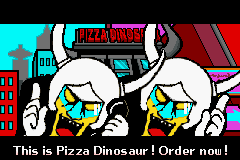 |
WarioWare: Twisted! | The Dinosaurs are a pair of characters who antagonize Mona. They appear in some of Mona's subplots as antagonists, rivalling her in her business, though she always manages to outperform them. In Twisted!, they own the restaurant chain Pizza Dinosaur, a rival of Mona Pizza with inferior pizzas and customer service but a very large number of locations. In Touched!, they are members of a band with Vanessa, rivalling Mona's band. |
| Mandrake | ||
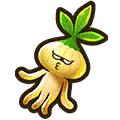 |
WarioWare: Touched! | Mandrake (also called mandrake root and originally translated as Nasty Garlic) is a seemingly sentient plant from the demon world said to lethally scream when dug up from the ground. It is a recurring object in the series, often being associated with Ashley due to its usage as an ingredient in her magic potions. In Touched!, Wario mistakes it for garlic and eats it, filling him with Awful Viruses; his immune system transforms these into Wario Viruses, causing him to become Wario-Man. |
| 13-Amp | ||
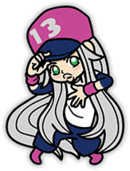 |
WarioWare Gold | 13-Amp is a cocky, self-confident high-schooler and self-proclaimed "rapping phenomenon", being the best rapper in her high school (though she keeps this fact a secret from her parents, who consider her a "shy and bookish type"). In addition to rapping, she has also been seen acting as a DJ. Having recently moved to Diamond City, she has trouble making friends. In her first appearance in Gold, 13-Amp serves as 18-Volt's rival and engages in a rap battle with him; however, in later games, she is friends with 9-Volt and 18-Volt. |
| Doris 1 | ||
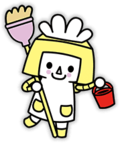 |
WarioWare Gold | Doris 1 is a cleaning robot invented by Dr. Crygor, who abandoned her in Agate Forest. She lived alone and cleaned up in the forest for a long time, where she once had a paranormal encounter with a ghost. In Gold, Dr. Crygor and Mike discover her in the forest while searching for fungi; Doris 1 uses her face recognition to identify Crygor as her creator and chases after him in anger, attempting to kill him as revenge for him leaving her to die. Afterwards, however, Crygor takes her back to his lab in an act of generosity, though Mike seems mildly annoyed at this. Since then, Doris 1 has been seen accompanying Crygor, Mike, and Penny on occasion. |
| Mr. Sparkles | ||
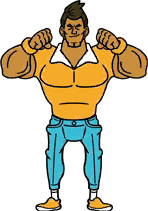 |
WarioWare Gold | Mr. Sparkles is an enthusiastic, constantly smiling bodybuilder who first appears in Gold, in which he holds a workout session on television that 5-Volt takes part in, using heavy frying pans that he is promoting. Mr. Sparkles, now wearing a toga, reappears in Move It! as the host of Megagame Muscles and sings its eponymous song. |
| Leo | ||
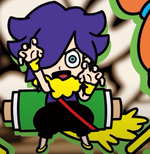 |
WarioWare: Get It Together! | Leo is a villainous ninja who sometimes serves as an antagonist in Kat & Ana's subplots. He can turn his hands into large lion paws when fighting, and can also use the ninja spell "Puppetry" to control animals and "Lion's Roar" to transform into a lion. He first appears in Get It Together!, where he attacks Sleepytown Village and makes the animals wreak havoc, but he is defeated by Kat & Ana. He appears again in Move It!, in which he steals a map from Kat & Ana, but he ends up being eaten by Cractus. |
Gallery
Former series logo used until WarioWare Gold
The Japanese versions of all of the games as of WarioWare: Move It!, as displayed on the series's official website
Names in other languages
| Language | Name | Meaning | Notes |
|---|---|---|---|
| Japanese | メイド イン ワリオ[?] Meido in Wario |
Made in Wario | |
| Chinese (simplified) | 瓦力欧制造[?] Wǎlì'ōu Zhìzào |
Made in Wario | |
| Chinese (traditional) | 瓦利歐製造[10] Wǎlì'ōu Zhìzào |
Made in Wario | |
| Korean | 메이드 인 와리오[?] Meideu In Wario |
Made In Wario |
Trivia
- Wario in his WarioWare outfit is seen in Wario Factory Court in Mario Power Tennis.
- From WarioWare, Inc.: Mega Party Game$! to WarioWare Gold, the European game covers of WarioWare games were all yellow, whereas other regions vary in cover color with each game.
- From WarioWare, Inc.: Mega Microgame$! to WarioWare: Touched!, Wario's voice clips were recycled from Wario Land 4 and Wario World. From WarioWare: Smooth Moves onward, Wario has a set of unique voice clips.
References
- ^ "In Polygon Studio you could create 3D models and animate them in the game, but there was also a side game included inside. In this game you would have to play short games that came one after another. This is where the idea for WarioWare came from." – Abe, Goro (April 7, 2006). Nintendo R&D1 Interview. Kikizo (English). Retrieved June 29, 2024.
- ^ Brian (March 5, 2017). 1-2-Switch producer says the game wasn’t planned to be part of WarioWare, why it isn’t pre-installed. Nintendo Everything (English). Retrieved August 10, 2017.
- ^ November 21, 2005. クリエイターズ・ファイル:「優しいキモチが何よりも大切」任天堂、竹内高さん. Gpara (Japanese). Archived January 22, 2007, 14:02:00 UTC from the original via Wayback Machine. Retrieved June 29, 2024.
- ^ Product > Speciality Products > Piezoelectric Devices2 > Piezoelectric Devices >ceramic gyro. NEC/TOKIN. Archived November 18, 2016, 05:55:48 UTC from the original via Wayback Machine. Retrieved June 29, 2024.
- ^ Griffin, Ben (June 5, 2012). E3 2012: Game & Wario Announced. Computer and Video Games (English). Archived November 30, 2014, 18:08:22 UTC from the original via Wayback Machine. Retrieved June 29, 2024.
- ^ Company History. WarioWare, Inc. Official Site (English).
- ^ Iwata Asks: WarioWare Smooth Moves. Nintendo of America (American English). Retrieved June 29, 2024.
- ^ Iwata Asks: WarioWare: D.I.Y.. Nintendo of America (American English). Retrieved June 29, 2024.
- ^ Volume 5: WarioWare: Snapped! - Iwata Asks. Nintendo of America (American English). Retrieved June 29, 2024.
- ^ June 16, 2021. E3發表的Nintendo Switch遊戲軟體最新資訊公開! 多款支援中文作品預定發售!. Nintendo HK (Traditional Chinese). Retrieved June 16, 2021.
